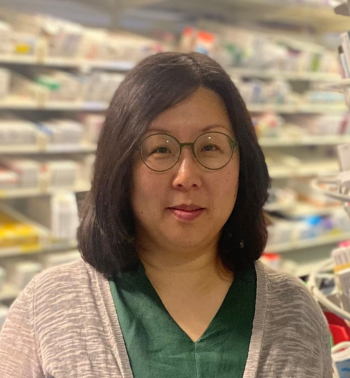13 August 2024
“Research is not a solo act,” says Dr Mandy Wan, recent NIHR award recipient. Dr Wan has dedicated her career to advancing paediatric medicine. As the Lead Paediatric Research Pharmacist, she has been pivotal in managing clinical trials that bring innovative treatments to young patients. Her dual role as a clinical academic reflects her commitment to the integration of research with clinical practice. In this interview, Dr Wan shares insights into her role, recent achievements, and top tips.
What is your role?
I have been the Lead Paediatric Research Pharmacist at Evelina London for well over a decade. Working alongside doctors, nurses, and other research staff, we look after children and young people taking part in research studies. At the Evelina, we work on around 50 to 60 clinical trials at any one time, and my team is responsible for ensuring that medicines used in these clinical trials are managed appropriately. Alongside this role, I am a clinical academic with a research interest in paediatric medicine development and its use in clinical practice.
You’ve recently been awarded a NIHR Senior Clinical and Practitioner Research Award, can you explain a bit about this?
I am delighted to be awarded this award. The Senior Clinical and Practitioner Research Award is a new NIHR award aimed at senior clinicians and practitioners who have previously obtained a PhD/MD. The award will give the individual between 20% and 50% of protected time from their current roles to engage in research activities. It is a personalised award that allows you to tailor a research programme to fit your development needs. For example, I will be working with a European research group to better understand the disease course of children with chronic kidney disease as well as undertaking some additional academic training on statistical modelling.
What do you enjoy most about your role?
I enjoy the process of planning and delivering research as a team, engaging in discussions about the various uncertainties in healthcare. It is very satisfying to see how meticulous planning and execution can lead to a successful research project. I also enjoy the creativity involved in problem solving and conveying complex ideas to diverse audiences. It is rewarding to be part of a team that has contributed to scientific knowledge, even if modestly, knowing that others can build on our work for years to come.
What are the challenges of being a clinical academic pharmacist?
Like many clinical academics, I find it challenging to juggle clinical responsibilities with conducting research. A career as a clinical academic is also a relatively new path for pharmacists, with only a minority of the pharmacy workforce currently involved in research. This has meant that I have had to forge my own path which was both stimulating and confusing at times. Nonetheless, I have been fortunate to have great mentors who shared their knowledge and provided me with opportunities for growth.
What are the benefits of working in partnership?
Research is not a solo act. In today’s complex healthcare systems, collaborative work across disciplinary boundaries is essential to ensure the effective translation from bench to bedside. Importantly, different perspectives can create new ideas, and this is what makes research interesting.
What would be your one career top tip?
Saying YES! Be prepared to get out of your comfort zone and seize opportunities as they arise.
Find out more about the work of KHP Women and Children's Health.





